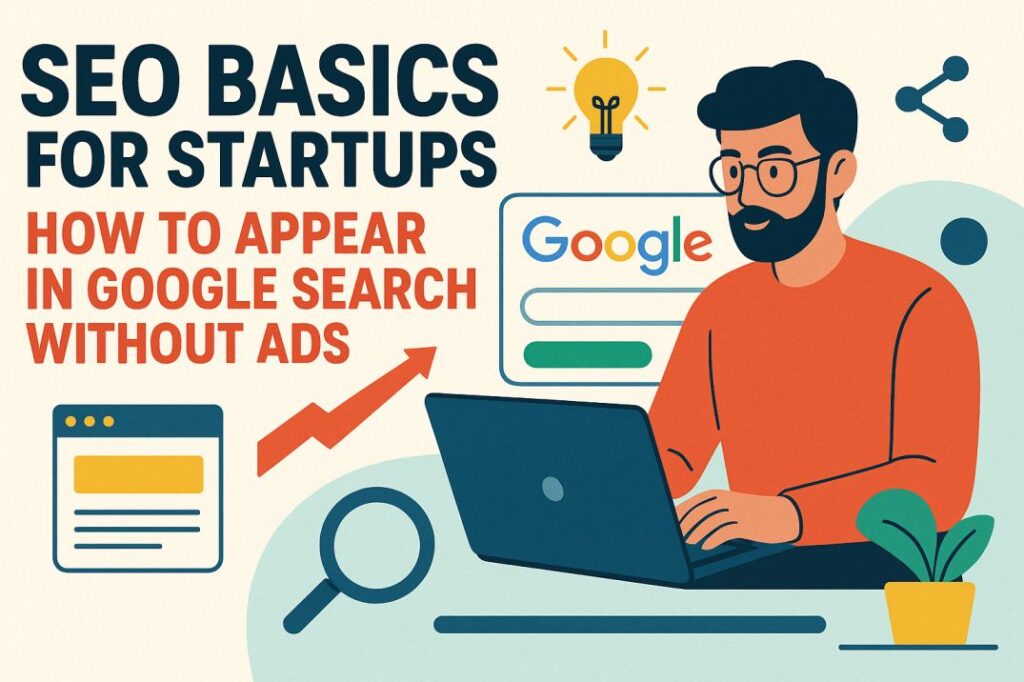Starting a new business is exciting—you’ve got your big idea, maybe even a slick website, but then the harsh reality hits: nobody is visiting your site. That’s when most founders panic and start pumping money into ads. But here’s the secret sauce: you don’t have to spend on ads to get noticed. That’s where SEO (Search Engine Optimization) comes in. Done right, SEO can help your startup get found by the right people at the right time—without burning through your marketing budget.
Let’s break this down in plain language, no jargon overload.
What is SEO in Simple Words?
Think of Google as a giant library. Every website is like a book. If your book isn’t organized or doesn’t have the right title, the librarian (Google) won’t recommend it to readers (your customers). SEO is the process of making your website so clear, useful, and relevant that Google can’t help but put it on the front shelf.
Why Should Startups Care About SEO?
Here’s the truth: startups usually don’t have big budgets. Competing with giants who run ads 24/7 is tough. But SEO levels the playing field. A well-optimized blog post or landing page can outrank competitors—even if they’ve got deeper pockets.
Bonus: SEO works for you 24/7. Unlike ads that stop the moment you stop paying, good SEO keeps bringing in traffic for months or even years.
Step 1: Know What Your Customers Are Searching
Before you type a single word on your site, ask: What would my ideal customer Google?
For example:
- A vegan bakery startup should think about searches like “best vegan cakes near me” or “dairy-free birthday cakes.”
- A SaaS tool for freelancers might target “best invoicing software for freelancers.”
👉 Use tools like Google Keyword Planner, AnswerThePublic, or even just the Google search bar’s auto-suggestions to find real questions people are asking.
Step 2: Fix Your Website’s Basics
Imagine inviting people over to your house but leaving the front door stuck, lights off, and furniture scattered everywhere. That’s what a messy website looks like to Google.
Here are quick fixes you can do today:
- Fast loading speed: Nobody likes waiting.
- Mobile-friendly design: Most searches happen on phones.
- Clear URLs: Instead of
yoursite.com/page?id=12, make ityoursite.com/vegan-birthday-cakes. - SSL certificate (HTTPS): Google loves secure sites.
Step 3: Create Content That Actually Helps
Google doesn’t rank websites—it ranks answers. So, give people the answers they’re looking for.
Tips for creating content that ranks:
- Write blog posts that solve real problems.
- Use headings (H1, H2, H3) so readers and Google can scan easily.
- Add images, infographics, or short videos.
- Keep it conversational—nobody enjoys reading like it’s a textbook.
For example: Instead of writing “Our SaaS software is robust and feature-rich,” try “We help freelancers get paid faster with easy invoicing.”
Step 4: Use Keywords the Smart Way
A rookie mistake is stuffing keywords everywhere like it’s a turkey on Thanksgiving. Don’t do that. Google is smarter than that.
Instead:
- Use your main keyword naturally in the title, first paragraph, and a couple of subheadings.
- Sprinkle in related keywords (synonyms, variations).
- Always write for humans first, Google second.
Step 5: Get Backlinks (a.k.a. Internet Street Cred)
Backlinks are like recommendations from friends. If other reputable websites link to your site, Google sees it as a vote of confidence.
Ways to earn backlinks:
- Guest post on industry blogs.
- Create share-worthy content (guides, infographics, stats).
- Get listed in directories or startup databases.
Step 6: Don’t Forget Local SEO
If your startup is location-based (like a cafe, salon, or co-working space), local SEO is your best friend.
- Claim your Google Business Profile.
- Add your business hours, photos, and location.
- Encourage happy customers to leave reviews.
That way, when someone searches “best coffee near me,” you’re not invisible.
Step 7: Keep Improving and Measuring
SEO isn’t a one-time project. It’s like going to the gym—you don’t get six-pack abs after one workout.
Use free tools like Google Analytics and Google Search Console to track:
- Which keywords bring visitors
- Which pages get the most traffic
- What needs improvement
Final Thoughts: SEO is a Long Game, But Totally Worth It
SEO won’t make you go viral overnight, but it builds a strong foundation. As a startup, your goal isn’t just clicks—it’s consistent, high-quality traffic that converts into loyal customers.
If you start today, in 6–12 months you’ll thank yourself for planting the seeds early.
Remember, Google doesn’t care about who has the biggest ad budget. It cares about who gives the best answers. That’s where your startup can shine.

